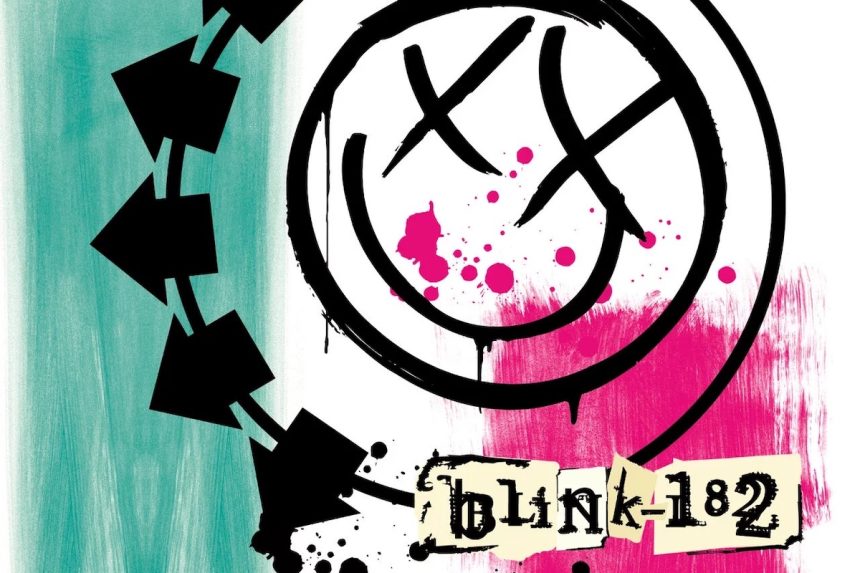In Dan Ozzi’s book Sellout, Mark Hoppus responded to the idea that blink-182’s popularity was “ruining the scene” by saying, “I want my music on the radio. I love our band and I want everybody to hear us. I want everybody to come to the party.” Still, blink-182 would learn that playing the game of mainstream success means making compromises you don’t always want to make. When they turned in Take Off Your Pants and Jacket, they were told by their manager that it didn’t have a single, so Mark and Tom responded by hastily, angrily, and begrudgingly writing “The Rock Show” and “First Date.” They became the album’s biggest hits, and to this day, blink-182 play them both every night.
In TOYPAJ‘s aftermath, when Tom’s urge to explore musical territory beyond pop punk had hit its breaking point, he felt like the only option was to start a different project, Box Car Racer. The project’s sole album saw him exploring everything from Quicksand/Refused/Fugazi-inspired post-hardcore to acoustic balladry, with serious subject matter and no dick jokes. (Well, almost.) With Travis Barker on drums and Jerry Finn producing, it was made by 3/4 of the same people that made blink’s hit records Enema of the State and Take Off Your Pants and Jacket, and it even had Mark Hoppus duetting with Tom on one song, “Elevator.” Tom hadn’t necessarily intended for the album to become a hit, but it did, and it would end up changing the trajectory of blink-182 forever–sometimes for better, other times for much, much worse.
Mark felt betrayed by Tom and Travis making an album without him, and it started a rise in friction between Tom and Mark that would cause the band to break up in 2005, and–after their 2009 reunion–would cause Tom to depart the band in 2015. (As you may have heard, they’ve made up again.) But on the other hand, Box Car Racer and its success opened the doors for blink-182 to make a record that wasn’t held back by the expectations of a juvenile, easily-digestible pop punk hit. Tom said in a 2017 interview with Billboard that the inner-band drama led to a conversation where the band decided that, if Tom wanted to make music like Box Car Racer, they would do it in blink-182.
To make their most expansive record yet, the band rented out a house, allowing themselves to really live with these new songs, spend more time on them than they’d ever spent on a record before, and write and demo everything collaboratively. It wasn’t just that the music was more serious and less constrained by the confines of pop punk; it was also that the band was working through creative differences as a unit, and keeping open minds to all the various directions these new songs could go in. They tried out new recording techniques and new guitar and drum sounds, employed a variety of different instruments, and obsessed over arrangements–they didn’t just go with the first ideas that popped into their heads. It made for a process that took way longer than planned; the owners of the house ended up kicking them out after about three months, and then they had to hop from studio to studio as they painstakingly finished the album. The whole process took almost an entire year, and the band said in the MTV Album Launch documentary for the album that they kept pushing things back and turned it in at the last possible minute to get it out at the late-in-the-year release date of November 18, 2003.
These 15 new songs were presented to the world with an album cover that displayed a smiley face with X’s for eyes and five arrows on the side of its face, some pastel colors, and the words “blink-182.” Some people called the album blink-182, some called it “self-titled,” but the band often maintained that it was untitled. A self-titled album that far into a career usually marks a new beginning, or the coalescing of a band’s identity, but an untitled album marked something even greater than that. “I want this record to take what people think blink-182 is and completely destroy that and rebuild it into something really different than it’s ever been,” Mark said on MTV Album Launch. That’s exactly what it did.
Especially at this point, I think even Mark would admit how much influence Box Car Racer did have on the direction of the album, and it’s easy to hear; from the gargantuan post-hardcore riffs of “Obvious” to the melancholic acoustic balladry of “I Miss You,” these songs often sound like a logical progression from BCR, but what makes this album still stand so tall after 20 years is how much it really is an album that could’ve only come from Mark, Tom, and Travis working together. Tom may have lit the fire, but Mark and Travis threw gas on it. It’s the three of them bringing all of their own ideas to the table, bouncing off of each other, and directly clashing with each other that makes this album an even more towering force than the side project that preceded it.
Travis, who remains one of the most talented drummers in popular music of the past quarter-century, brought plenty of his unique flair to Box Car Racer, but even on that album, he was brought in later on after Tom had already written a chunk of the material. Being involved from the start on the untitled blink-182 album, Travis brought all kinds of rhythms and patterns (and his own two-minute trip-hop interlude) that often steer the ship as much as the lead vocals do. Travis had already been heavily involved with arrangements and with pushing Mark and Tom out of their double-time punk rock comfort zone since he joined the band in 1998, but on the untitled record, his presence was felt on a whole new level. Tom took what he started in Box Car Racer in an array of thrilling new directions, pushing both his guitar style and his singing style to now-iconic places they’d never gone before. And as much as Box Car Racer gets mentioned when talking about how this album came to be, it can’t be overstated how much Mark’s songwriting evolved and how indispensable his contributions to this album are. Tom and Mark’s individual tastes had obviously drifted in different directions from the days when they both obsessed primarily over bands like Descendents and Screeching Weasel, and ‘untitled’ is such a unique record because of the ways they’re constantly pushing each other. I don’t think either of them writes what they wrote for this album without the other there to check them and challenge them.
With SoCal skate punk getting usurped in popularity but the darker melodrama of emo, blink-182 were smart to make an album that veered in that direction, make gothy-looking music videos, and take out bands like Taking Back Sunday, Motion City Soundtrack, and The Used. But, unlike some of the other pop punk giants that traded in baggy shorts for tight pants and eyeliner, blink never seemed disingenuous. They’d been riding for Jimmy Eat World since Static Prevails, and letting their love of everything from Quicksand to The Cure shine through was just blink-182 being true to themselves–it just so happened that the rapidly-rising emo-pop bands of that era were channelling the same influences. But more so than good timing, more so than branching out from pop punk, hundreds of thousands if not millions of us have been marveling at the untitled blink-182 album for 20 years because it doesn’t sound like anything that’s come before or since. They weren’t just expanding their sound; they were practically inventing a new style of music.
From the opening track and first single, “Feeling This,” it was obvious that blink-182 had tapped into something new. Powered by a steadily unsteady Travis Barker rhythm and a Tom DeLonge post-hardcore riff, Mark and Tom shout their way through the verses, then tone things down and take a melodic turn on the chorus, with guitars dropping out almost entirely. The bridge is just about as minimal and even more gorgeous than the chorus, and Tom doesn’t even bash out a single power chord until the very last chorus, which arrives as the kind of long-awaited release that you never would’ve heard on an earlier blink record. The best part, though, is the ending, where Mark keeps the chorus going and Tom starts singing a bunch of nearly-indecipherable stuff behind him. It’s Mark and Tom dual vocals at their best, and it’s one of those moments where blink–and probably Jerry Finn–emerge as experts of layering and arrangement.
“Feeling This” was a great way to introduce the world to this new version of blink-182, but it’s just the tip of the iceberg and not even the best song on this album. After “Feeling This” and the much heavier “Obvious,” blink-182 introduce what remains one of their softest, most somber songs, “I Miss You.” It’s been memed to death, so it’s actually kind of easy to forget how much of a revelation this song was. The interplay between Travis’ brushstrokes, Mark’s upright bass, Tom’s acoustic guitar, the piano, and the eventual cello is complex in a way that blink-182 songs never were, despite sounding so stripped back. It’s now one of blink-182’s top three biggest songs, but when it came out, this was a genuinely weird song for radio and television to be playing as constantly as it was.
After “I Miss You,” the untitled album just gets weirder and weirder. I don’t know what “Violence” is; all I know is it miraculously works. The minimal bass/drums/talking verses might be the most purely odd pieces of music that blink-182 have ever recorded, and somehow they resolve into an absurdly catchy post-hardcore chorus. “Stockholm Syndrome” is as catchy and energetic as blink-182’s pop punk days but the opposite of formulaic. It starts out seesawing between Tom yelling and Mark softly singing over a burst of loud rock music, and then transitions into a Mark-sung, palm-muted sugar rush, until Mark becomes the one yelling, his voice covered in distortion as the band pummels away at a suspenseful post-hardcore buildup. Even 20 years later, there’s no pre-existing genre term to quickly describe what this song sounds like. It’s like, art rock as seen through a combination of post-hardcore and pop punk? Even that doesn’t fully do it justice.
Not that blink-182’s lyrics have ever been their strong point, but they match these darker, more adventurous songs with at least an attempt to capture something with a little more depth. You feel it when Mark intones “I’m so lost, I’m barely here” on “Stockholm Syndrome,” or when Tom wails “Tidal waves, they rip right through me” on the yearning power ballad “Down.” It’s still built to resonate with young people, but it captures the longingness associated with your teens and early 20s, rather than prank-calling your girlfriend’s mom.
A true piece of album-oriented music, the untitled LP keeps progressing from start to finish and some of its best songs are in the latter half of the album. “Go” is its hardest, fastest punk song, and not in a way that blink-182 ever would’ve written prior to this record. “Asthenia” is another early sign of Tom’s outer space obsessions, but unlike “Aliens Exist,” the celestial atmosphere extends to the music. The musically-diverse track spans from bouncy post-punk to a big riff that would work in a pop punk song. It’s one of many songs that shows off how unique Tom’s guitar style had become by the time of this album. He went from a being teenager ripping off Screeching Weasel riffs to a twentysomething setting his sights on The Cure, and he landed in a strange, rarely-occupied middle ground between those two things that he was uniquely qualified to thrive in.
Speaking of The Cure, blink shot their shot, and they ended up nabbing Robert Smith for guest lead vocals on the moody, mid-tempo “All of This.” As legend has it, blink were afraid Robert wouldn’t do it because of their reputation as a juvenile pop punk band, to which Robert replied, “Nobody knows what kind of songs you are going to write in the future and nobody knows the full potential of any band. I really like the music you sent me.” Not everyone bothered to notice how much blink-182 had grown when they put out this record, but if you’ve got Robert Smith on your side, I’d say you’re in pretty good shape.
The most Cure-sounding song on the album isn’t the one with Robert Smith, though; it’s “Always.” Kind of like blink-182’s answer to “Lovesong,” “Always” is a truly sweet post-punk love song–a rare song in their catalog that you would actually call “romantic”–and done in the way that only blink-182 could do. From Mark’s bass chords to Travis’ rhythmic magic to Tom’s love-it-or-hate-it wails, it’s unmistakably blink-182, but it’s also a rare Cure homage that remembers The Cure wrote pop songs. Countless bands have ripped off their moodiness; few have tapped into their sweet pop hooks the way blink-182 did with “Always.”
As much as blink-182’s untitled album is triumph marked by a band overcoming tension and creative differences, it was also the beginning of their end, and that’s foreshadowed by the album’s two closing tracks: the Mark-sung “Here’s Your Letter” and the Tom-sung “I’m Lost Without You.” The former is an underratedly catchy indie-punk anthem that sets the tone for Mark and Travis’ post-blink band +44 and the latter is a weepy, six-plus minute ballad that sets the tone for Tom’s post-blink band Angels & Airwaves. I don’t know if they had any intentions or predictions that it would turn out/come off that way, but it very much feels like the album ends with a hint at where Mark and Tom’s heads were starting to be at.
The untitled blink record was also a triumph for producer Jerry Finn, who Mark’s referred to as the fourth member of blink-182. Having basically invented the sound of glossy pop punk perfection on Enema of the State and Take Off Your Pants and Jacket, Jerry helped the boys achieve something a little more organic-sounding on this record, which is exactly what they needed to drive home the newfound maturity. There’s still almost definitely some pitch correction and things like that going on, but after releasing two records that made such a big impact partially because of how inhuman they sounded, ‘untitled’ sounds like a very honest, human record. They couldn’t have done it without a huge budget, but a big-budget record doesn’t have to be an inauthentic record, and this album bleeds authenticity.
It’s also because of all the money that was put into it, because of how famous they were, that this record really did feel like a risk. blink-182 and Geffen Records were taking a chance with an album like this. It could’ve become a cultishly-loved but lukewarmly-received record like Green Day’s strive towards maturation three years earlier. But ‘untitled’ became a hit, as did most of its singles. They were able to make a genuinely experimental record that retained the pop smarts they’d perfected across Enema and TOYPAJ. It was pop punk’s answer to Pet Sounds, another artistically ambitious undertaking by a California band whose early successes were considered immature. And like Pet Sounds, it’s a record we’ve been listening to and talking about for decades because you discover something new every time.
**
blink-182’s untitled record was a new benchmark in creativity for blink-182, but it was also the beginning of the end. The tensions between Mark and Tom kept rising, and the band ultimately broke up just about 15 months after its release. The untitled record sounded like the start of a new chapter, but since it ended up being the end of one, it’s also always felt like unfinished business. Mark and Travis went on to do +44, as Tom went on to do Angels & Airwaves, and there’s an Ethan-Hawke-in-Boyhood-style imaginary blink album to be made with the best halves of those albums, but we’ll always be left wondering how some of those songs would’ve sounded if Mark, Tom, and Travis actually did write them together. blink-182 stuck to the more mature, adventurous vibes on their 2011 comeback album Neighborhoods and on parts of their 2023 second-comeback album One More Time, though neither of those albums fully reach the heights of ‘untitled,’ and both are missing the added magic of Jerry Finn, who sadly passed away in 2008 at age 39.
Even if blink-182 never release a truly worthy successor to the untitled album, it put all three members on paths towards evolving and progressing and getting out of their comfort zones. They’ve had their moments of leaning into Enema of the State nostalgia, but for the most part, ‘untitled’ marked a maturation that really stuck. And it’s greatest impact might be that it’s an album that encouraged other bands–especially other pop punk bands–to be themselves. I’ve seen bands bring it up as an influence not necessarily because they sound like it, but because it taught them not to set themselves limits.
My only gripe: the version of this album on streaming services has a bonus track, and it’s a live recording of “Anthem Part Two” from TOYPAJ instead of “Not Now,” the outtake from the untitled sessions that remains one of the best blink-182 songs ever written. Makes no sense!
–









